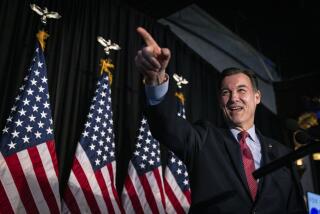Maybe stalemate’s latest victory means voters will finally win
WASHINGTON — For almost a generation, America’s two major political parties have fought for supremacy in a fundamental debate over the size and scope of government. They have battled to a draw.
On such questions as whether Americans should pay higher or lower taxes, whether Medicare and other entitlements should be scaled back, and whether millions of illegal immigrants should be pushed to leave the country or given a path to citizenship, Democrats and Republicans have stalemated. Leaders of each party have deferred compromise in the hope that voters would give their side a clear mandate.
On Tuesday, Democrats won a significant victory, reelecting Barack Obama as president and retaining control of the Senate. Still, America’s most expensive election did almost nothing to change the Capitol’s balance of power. The Republican-controlled House will, if anything, have a more conservative tilt. And for the fifth time in six presidential elections, the victor appears likely to have carried less than 51% of the popular vote.
Paradoxically, that lack of change could be the best hope for progress in a 50-50 nation. The results appear to say to each party that its strategy has hit a wall.
Republicans will face the most immediate reckoning. Not only did the party lose a presidential election that strategists thought was highly winnable, but the nature of the loss poses severe challenges for elections to come. Mitt Romney’s votes came overwhelmingly from older whites, whose share of the electorate is declining. He lost decisively among minorities, whose share is on the rise, doing even worse among Latinos than did Sen. John McCain in 2008, exit polls indicated.
Latino leaders have warned the party for years that its hard-line position on illegal immigration risked turning away that crucial voting bloc. Some prominent Republican strategists agreed. Latino groups now plan to make a renewed push for immigration reform, and GOP lawmakers will face a tough choice.
Republicans “have alienated the Latino vote. If they ever want to win the presidency again, they need to get right with Latinos,” said Eliseo Medina, secretary-treasurer of the Service Employees International Union and a key strategist for the immigration reform forces. “It’s their choice.”
But the election returns showed weaknesses for Democrats too. The party had hoped for big gains in the House based on a campaign defending the status quo on Medicare and Social Security. It gained almost nothing.
“Voters know something is wrong with those programs,” said Jim Kessler, policy director of Third Way, a moderate Democratic think tank in Washington. “They want to see pragmatism.”
For years, as each party tried to establish a stable, long-term majority, pragmatism is precisely what they have avoided. Both sides have preferred to wield issues as weapons to mobilize voters.
The approach has worked — at least to a point. For all the complaints about negative campaigns, polarized politics has boosted election turnout to its highest levels since 1971, when 18-year-olds received the right to vote, and the number of Americans who say they feel engaged in politics has risen.
Several times, political strategists on one side or the other have felt close to triumph. In 1992 and 2008, Democrats won victories that allowed them to believe their goal was in sight, only to suffer stinging defeats two years later. In 2004, it was Republicans’ turn to crow and then quickly see their advantage disappear.
This year, at least by the end of the campaign, neither side seemed to be under any such illusions.
The first big test of whether either party feels chastened will come quickly, on the core issues of spending and taxes. As of Jan. 1, taxes will go up across the board and sharp spending cuts will kick in for both defense and domestic government programs unless Congress and the president agree on a different course.
Both sides say they want to avoid that so-called fiscal cliff. If they can agree by year’s end on a framework to resolve the issue, that could open the way to a broader compromise.
But doing that will involve “hard compromises,” said Bill Galston, an analyst at the Brookings Institution. The government’s budget problems stem mostly from the rising costs of taking care of an aging population. Any compromise on that will almost certainly include higher taxes as well as limits on benefits and will involve a deal “where both political parties consider elements of the package to be bad public policy, counterproductive or even immoral,” Galston said.
How far either side will go will depend to a considerable extent on the president. A chief executive has only limited ability to change the minds of voters who oppose him. But presidents can lead their supporters to accept ideas they might previously have resisted.
Obama offered mixed signals in his final weeks of campaigning. He voiced support for compromise, but also pledged toughness as he sought to reassure Democrats who worried that he had bent too easily during negotiations with Republicans over the debt crisis last year.
“I’ll work with anybody, of any party, to move this country forward,” he said in his final campaign speech, Monday night in Des Moines. But, he added, there are “some principles you got to fight for.”
“If the price of peace in Washington is cutting deals to kick students off of financial aid, or get rid of funding for Planned Parenthood, or let insurance companies discriminate against kids with preexisting conditions, or eliminate healthcare for millions on Medicaid who are poor, or elderly, or disabled — I won’t pay that price. That’s not a deal I will make.”
That sort of deal, he said, is “not bipartisanship,” but “surrender.”
Times staff writer Lisa Mascaro contributed to this report.
More to Read
Get the L.A. Times Politics newsletter
Deeply reported insights into legislation, politics and policy from Sacramento, Washington and beyond. In your inbox three times per week.
You may occasionally receive promotional content from the Los Angeles Times.







